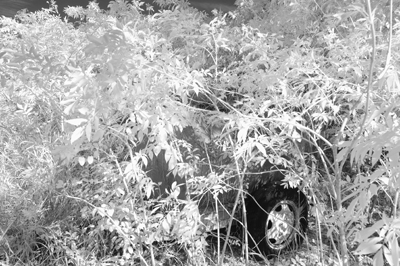 I’m memorizing a license plate number, which I glimpsed when he grabbed me by my ponytail, punched me, and dragged me into his truck. I repeat it silently, obsessively. NLU-285.
I’m memorizing a license plate number, which I glimpsed when he grabbed me by my ponytail, punched me, and dragged me into his truck. I repeat it silently, obsessively. NLU-285.
Parked in the woods, dozens of miles from the lights of Portland, the midnight air is thick, damp, barely cool. I smell pine trees, clean soil, the season’s last wildflowers. Owls and other night animals make their twig-snapping, secret sounds. A sliver of moon provides plenty of light—that, and his endless chain of matches and Marlboros illuminate his profile. He inhales hard, the last drag, and flicks the butt in an arc out the window. “Might as well take you back,” he drawls.
He starts the truck. It stalls immediately. He curses—You dying fucking pig!—revs the engine and guns it into reverse, backs down the abandoned logging trail until he can turn and head for the rural road where my broken-down car waits. There, he pushes me out his passenger door, orders me to lie across my car seat until he drives away. I peek through my steering wheel and see that he drives half a mile before turning on his lights. Too late, asshole, I think. I’ve already got your number.
My keys are gone, and the VW’s battery is dead. I lock the doors and cry. Headlights behind me come up fast. I step into the road, wave my arms. The car slows; two young men stare, slalom around me and speed off. I limp to the nearest house, bang on the door, beg for help. A curtain twitches, but nobody answers. I go back to my car.
More headlights. I get out and wave again. The woman driver cracks open her window. I tell my story, hysterical. She says she has two little kids, makes me promise that I won’t hurt her, then lets me into her car. Her dad is a sheriff, she says. We’ll go to his house. She smells like alcohol, says her husband will be pissed for her staying out so late, but she and her girlfriends got to laughing…. She apologizes for talking too much and the car goes silent. Inside my head: NLU-285.
At his house in town, the sheriff uses a two-way radio to call for a patrol car. I call my brother who arrives at the same time as a deputy and a woman from the district attorney’s office. Her name is Peggy, she says, and she is my RVA: Rape. Victim. Advocate.
My brother turns sickly white when he sees me. The deputy scribbles in a notebook, raises his eyebrows when I repeat the license number. The digits were easy to remember, they were my phone prefix in Phoenix, I explain. I was afraid I’d forget the letters. NLU. My brother immediately coins a phrase: Not like you.
The sheriff’s wife, in slippers and robe, leads me to their guest bathroom. Fluffy aqua towels. I want to fill their tub with hot water and sink into it. Peggy already cautioned me not to wash or clean up; the hospital will want all evidence. In the oval gold-framed mirror, my left eye is purplish and swollen shut, my lips are bloody and puffed to clown-like proportions. Loose teeth. Handfuls of hair cover my white pullover; one clump has a strip of bloody scalp still attached. I gag, leave without turning on the water and return to the living room.
~ ~ ~
4 a.m. in the emergency room and this is a quiet night, just me and a softly moaning pregnant woman. My case calls for a protocol used only a few times before in this hospital. The doctor and nurses follow typed instructions on collecting a rape kit, which involves swabs, slides, a blood draw, and a tiny comb.
My body aches with tension; I’m bruised inside and out. The pelvic exam is excruciating. Peggy holds my hand as the doctor collects the evidence. A tear slides from my left eye, stinging its way across a bloody scrape on my cheek. NLU-285. I can’t stop. During stressful situations, I try to remove myself mentally: I recite song lyrics, conjugate German verbs, list previous addresses. My lips move silently, NLU-285.
Peggy asks me what I am saying, then says I should try to think about something else now. So I focus on the tear-away, one-day-at-a-time calendar under the military-time clock that clicks the seconds away: September 29, 1979. 9-29-79. 9-29-79. For the rest of my life.
—
Katherine Gries is a graduate of the Literary Nonfiction program at the University of Oregon. Her work has appeared in Oregon Quarterly, The Register-Guard, Eugene Weekly, and other regional publications. Katherine is working on a series of essays about life as a post-divorce single parent.
Photo by Pamela Z. Daum
